| # | Title | Year | Place | Materials | Measurements | Practice / Format | Together With | Keywords | Weblinks |
| 32 | Ver|un|einigung – Jalta. Positionen zur jüdischen Gegenwart 06 | 2019 | Neofelis Verlag | Softcover, 19 x 26 cm, 156 Pages | editing | Micha Brumlik, Marina Chernivsky, Max Czollek, Hannah Peaceman, Anna Schapiro, Lea Wohl von Haselberg | Collapse of the Soviet Union, GDR, 'Re-unification' | Neofelis Verlag |
Ver|un|einigung — Jalta. Positionen zur jüdischen Gegenwart 06
Der 9. November 1989 gilt als Wendepunkt der deutschen Geschichte, der im dominanzgesellschaftlichen Diskurs als eine Geschichte der ‚Wiedervereinigung‘ der Deutschen mit den Deutschen erzählt wird. Viele Jüd*innen sowie Menschen mit Migrationsgeschichten kommen in dieser Erzählung nicht vor. Ihre Perspektiven, Befürchtungen und Zukunftsvisionen wurden und werden überschrieben. Für die jüdische Gemeinschaft markiert der Zerfall der Sowjetunion einen weiteren Wendepunkt: Rund 200.000 Jüd*innen aus der Sowjetunion wanderten zunächst in die DDR und wenig später in die BRD ein. In der sechsten Ausgabe von Jalta sind streitbare Positionen zur Vereinigung versammelt, die den Widersprüchen der deutsch-deutschen Einheit nachspüren und Kontroversen sichtbar machen.
Mit Beiträgen von Marc Bausback, Andreas Brämer, Micha Brumlik, Stefanie Busch, Laura Cazés, Marina Chernivsky, Daniela Dröscher, Bianca Ely, Michel Friedman, Sabine Heinrich, Stella Hindemith, Sabrina Hohmann, Ina Holev, Alisa Joseph, Annetta Kahane, Daniel Kempin, Olaf Kistenmacher, Kathrin Krahl, Dani Kranz, Stella Leder, Naomi Lubrich, Leo Neumann, Angelika Nguyen, Hannah Peaceman, Nina Prader, Jana Scheuring, Reinhard Schramm, Michal Schwartze, Conny Siebeck, Lea Wohl von Haselberg und Fabian Wolff.
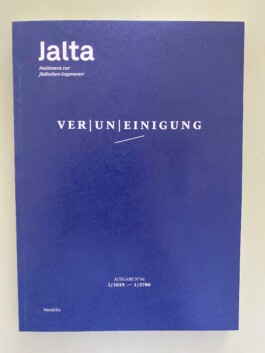

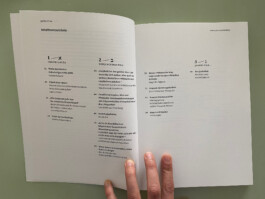
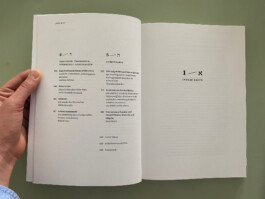
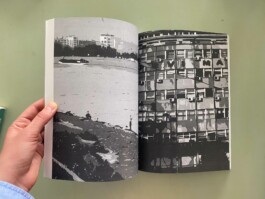
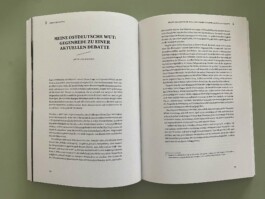
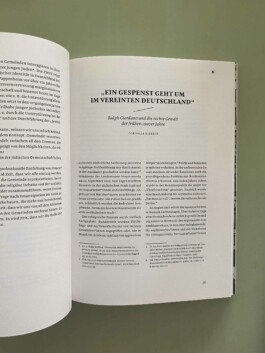
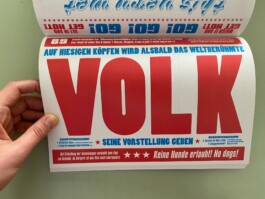
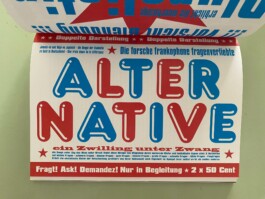
Ver|un|einigung — Jalta. Positionen zur jüdischen Gegenwart 06
Jalta is a magazine that appeared twice a year between 2017 and 2020; as of 2023, it appears semi-regularly in book form.
Jalta opens up a forum in which Jewish and non-Jewish voices can be heard. The various authors make often overlooked perspectives visible and establish connections between their positions. They articulate and develop critical positions and reflect current discussions and debates. Their contributions call into question socially mainstream narratives and power structures, they reflect the diversity of a post-migration society and show the potential for building alliances.
Jalta collects new positions and perspectives on a Jewish present, one that is predicated on the diversity of Jewish people living in Germany today.
In Jalta, academic texts, essays, literature and visual works of art all exist equally alongside one another. In this context, a wide range of cooperative projects have been developed — for example, a project with the Landeszentralen für Politische Bildung (Center for Political Education) and counseling centers for victims of racist and antisemitic violence. Other projects include various podium discussions in German-speaking contexts and the participation in a NSU-Tribunal.









| # | Title | Year | Place |
| 32 | Ver|un|einigung – Jalta. Positionen zur jüdischen Gegenwart 06 | 2019 | Neofelis Verlag |
| Materials | Measurements |
| Softcover, 19 x 26 cm, 156 Pages |
| Practice / Format | Together With |
| editing | Micha Brumlik, Marina Chernivsky, Max Czollek, Hannah Peaceman, Anna Schapiro, Lea Wohl von Haselberg |
| Keywords | Weblinks |
| Collapse of the Soviet Union, GDR, 'Re-unification' | Neofelis Verlag |
Ver|un|einigung — Jalta. Positionen zur jüdischen Gegenwart 06
Der 9. November 1989 gilt als Wendepunkt der deutschen Geschichte, der im dominanzgesellschaftlichen Diskurs als eine Geschichte der ‚Wiedervereinigung‘ der Deutschen mit den Deutschen erzählt wird. Viele Jüd*innen sowie Menschen mit Migrationsgeschichten kommen in dieser Erzählung nicht vor. Ihre Perspektiven, Befürchtungen und Zukunftsvisionen wurden und werden überschrieben. Für die jüdische Gemeinschaft markiert der Zerfall der Sowjetunion einen weiteren Wendepunkt: Rund 200.000 Jüd*innen aus der Sowjetunion wanderten zunächst in die DDR und wenig später in die BRD ein. In der sechsten Ausgabe von Jalta sind streitbare Positionen zur Vereinigung versammelt, die den Widersprüchen der deutsch-deutschen Einheit nachspüren und Kontroversen sichtbar machen.
Mit Beiträgen von Marc Bausback, Andreas Brämer, Micha Brumlik, Stefanie Busch, Laura Cazés, Marina Chernivsky, Daniela Dröscher, Bianca Ely, Michel Friedman, Sabine Heinrich, Stella Hindemith, Sabrina Hohmann, Ina Holev, Alisa Joseph, Annetta Kahane, Daniel Kempin, Olaf Kistenmacher, Kathrin Krahl, Dani Kranz, Stella Leder, Naomi Lubrich, Leo Neumann, Angelika Nguyen, Hannah Peaceman, Nina Prader, Jana Scheuring, Reinhard Schramm, Michal Schwartze, Conny Siebeck, Lea Wohl von Haselberg und Fabian Wolff.









Ver|un|einigung — Jalta. Positionen zur jüdischen Gegenwart 06
Jalta is a magazine that appeared twice a year between 2017 and 2020; as of 2023, it appears semi-regularly in book form.
Jalta opens up a forum in which Jewish and non-Jewish voices can be heard. The various authors make often overlooked perspectives visible and establish connections between their positions. They articulate and develop critical positions and reflect current discussions and debates. Their contributions call into question socially mainstream narratives and power structures, they reflect the diversity of a post-migration society and show the potential for building alliances.
Jalta collects new positions and perspectives on a Jewish present, one that is predicated on the diversity of Jewish people living in Germany today.
In Jalta, academic texts, essays, literature and visual works of art all exist equally alongside one another. In this context, a wide range of cooperative projects have been developed — for example, a project with the Landeszentralen für Politische Bildung (Center for Political Education) and counseling centers for victims of racist and antisemitic violence. Other projects include various podium discussions in German-speaking contexts and the participation in a NSU-Tribunal.








